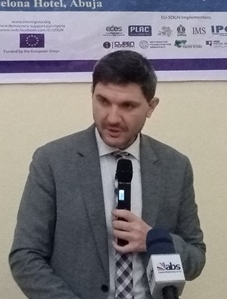
Head of the Democracy, Governance and Migration Section at the EU Delegation to Nigeria and ECOWAS
The European Union (EU) is determined to defend access to the information within its borders and worldwide as access to information is under increasing pressure, according to Mr. Clement Boutillier, Head of the Democracy, Governance and Migration Section at the EU Delegation to Nigeria and ECOWAS.
Speaking at a workshop for FOI Desk Officers of public institutions on the establishment of an online FOI platform, held in Abuja on February 1 and 2, 2022, Mr. Boutillier said the EU was promoting access to information and a free and fair media not only at home but globally in its relations with partner countries, adding that the Union was also supporting several projects to assist and protect freedom of information, journalists and human rights defenders across the globe.
Observing that “a law is only as good as it is adequately implemented”, he argued that the quality of democratic processes is linked to the state of access to information, freedom of expression as well as media freedom and pluralism and that there is no functioning democracy without full transparency and access to public information.
Mr. Boutillier noted that freedom of information and expression are fundamental rights enshrined in international law adding that most recently, new technologies have imposed themselves as extremely powerful mediums for the preservation and strengthening of this right.
He said: “Public, free, diverse and independent access to information are at the core of pluralistic and open society, while increasing the free flow of government information. In turn, it guarantees that government is better understood and reinforces in legitimacy by addressing sustainable development challenges and democracy deficits. Ultimately, FOI promotes government institutions that work for the people.”
Mr. Boutillier however regretted that there are still FOI requests that go unaddressed, insisting that “we must do all we can to address this challenge.”
According to him, “the right of access to information empowers citizens and civil society to obtain information held by public bodies, with limited exceptions. It encompasses a right to request and receive information, as well as an obligation for governments to publish information proactively.”
Describing access to information as an essential tool in the fight against corruption, Mr. Boutillier highlighted the value of such laws in identifying and uncovering corrupt practices and enabling participation in the development of anti-corruption policy and law.
He said to date, 129 countries have access to information laws while over 50 constitutions worldwide recognize this as a right, along with the legal framework confirming it.
Mr. Boutillier noted that although the demand for the implementation of the FOI law within public institutions is an important one, “an effective access to information law can only help if citizens and civil society know how to use it.”
He therefore called for more engagement with citizens to publicise the law and encourage citizens to use it.





